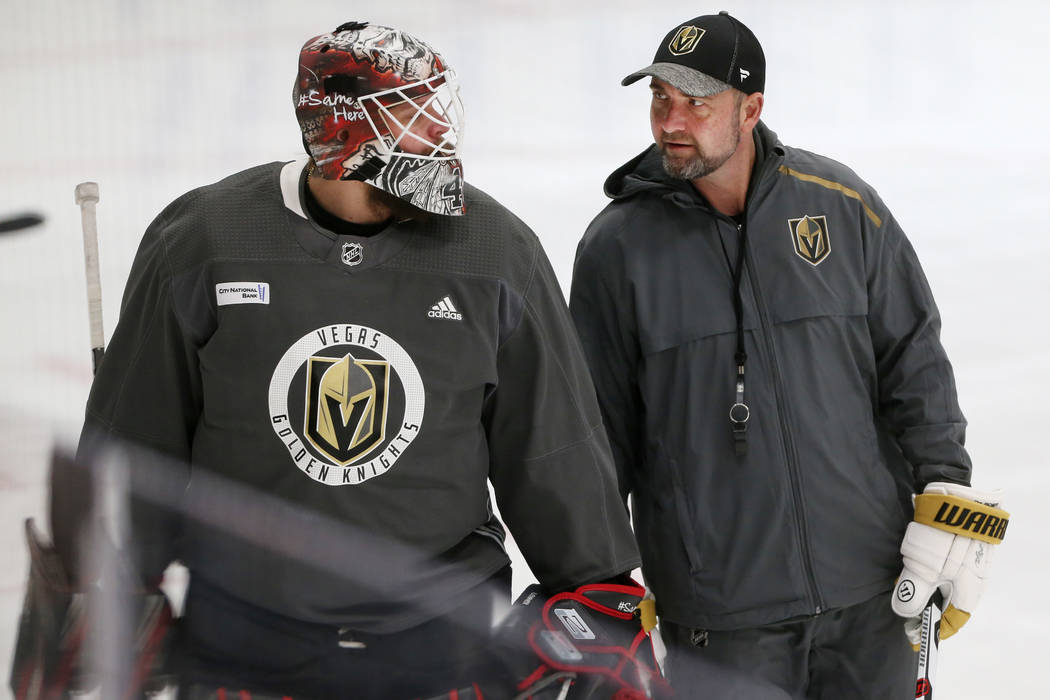Lehner, now a Golden Knight, continues journey to help others
Life’s unexpected turns: In the city where he gave one of the more memorable speeches on any awards show, sports or otherwise, Robin Lehner now continues his NHL career.
He does so for the Golden Knights and with the openness of someone who offered the world a front-row seat into his personal struggles.
A stigma hurts. So does facing one’s demons.
Lehner has done his best to help alleviate such battles for others.
He was traded from Chicago on Monday and now joins Marc-Andre Fleury to give Vegas one of the best goalie tandems in all of hockey for the team’s stretch run to a likely playoff berth.
It was 2019 when Lehner received the league’s Masterton Trophy, annually given to the player who best exemplifies the qualities of perseverance, sportsmanship and dedication to the game.
He pretty much had everyone beat solely on the perseverance part.
“I’m not ashamed to say I’m mentally ill,” Lehner offered that June evening in Las Vegas. “But that doesn’t mean I’m mentally weak.”
He had earlier, in a first-person essay for The Athletic, described his battles with mental illness and drug and alcohol addictions, with suicidal thoughts and turning to rehab.
He wrote about that dark place so many can’t escape. He wrote about those existing within an overcast image of reality, desperately trying to break free into the light.
“There is still a long way to go on the whole segment,” the 28-year-old Lehner said following his first practice with the Golden Knights on Tuesday. “I try to do the best I can to help, but there is a long way to go. Long way to go for everyone.
“At the end of the day, we’re still pretending that everyone is healthy and normal. A majority of people aren’t and yet we’re acting like we are. Then we discriminate against people who are not. That’s just the way it is. It’s unfortunate.”
One in five families across the country lives with some form of mental illness. Mine does. Maybe yours as well. But what Lehner and other professional athletes like Kevin Love and Brandon Marshall and Michael Phelps have done is hopefully lead others to seek help.
Reason being, mental illness doesn’t choose who it affects. It’s a societal flaw, believing high-level athletes couldn’t possibly suffer in the same manner as ordinary folks.
It’s just not part of the script most want to believe.
But if the strongest and most confident among us can be intimately touched by it, perhaps those not as famous can emerge from that indistinguishable chasm that causes significant feelings of anxiety and fear.
Maybe they won’t be as afraid.
“(Lehner) is an incredibly honest person, whether it’s about him professionally or personally,” said Nick Gismondi, a former member of the Golden Knights broadcast team and now a rinkside reporter for NBC Sports Chicago covering the Blackhawks. “He has owned all of his shortcomings, whether they are on ice or in life.
“Everything he has gone through as a person — that he’s very open about — his mental health journey, his addiction journey, it’s amazing how forthright he has been about it. You get a very open, genuine, honest guy. I think this is a very big win for the Golden Knights. It’s not often you get both an exceptional person and player at the same time.”
Live in moment
Lehner on Tuesday didn’t talk past this season. He is a pending unrestricted free agent who is expected to play a far more important role than did Malcolm Subban, the backup goalie sent to Chicago as part of Monday’s trade deadline deal.
Vegas is Lehner’s fifth NHL team over a career that has seen him play at least 33 games in each of the last four years. But maybe it’s best for all of us that we live more in the moment as he appears to do.
We all own what we can. Lehner is a person who has allowed others to join his personal travels toward better mental health and a more peaceful existence.
This was him shortly after his essay was published:
“It was extremely hard (sharing the story). The main reason I did it was hopefully I’ll help someone else to go through what I’ve gone through.
“Maybe someone in the league, maybe someone out there …”
He is a big man, listed at 6-foot-4 and 240 pounds.
But nothing equals the sizable good he is doing to erase a stigma so wrongly attached to the darkness.
Contact columnist Ed Graney at egraney@reviewjournal.com or 702-383-4618. He can be heard on “The Press Box,” ESPN Radio 100.9 FM and 1100 AM, from 7 a.m. to 10 a.m. Monday through Friday. Follow @edgraney on Twitter.



















